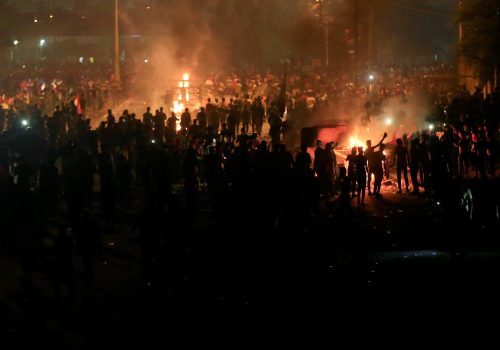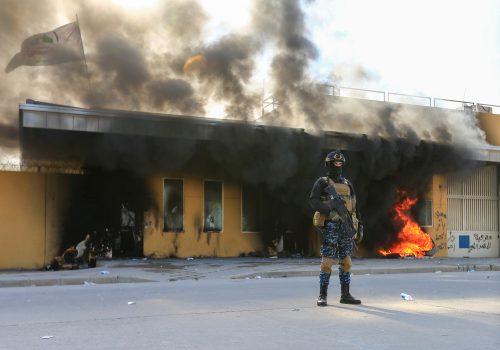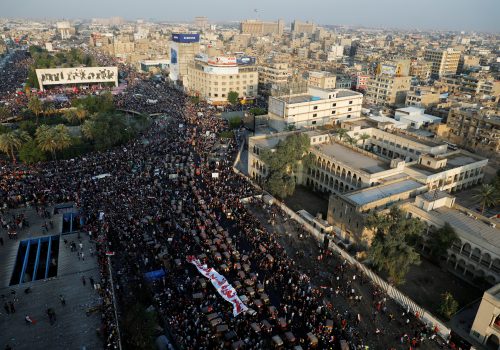Why Arab Sunnis are disengaged from Iraq’s protests
This article is based on discussions in January 2020 with Iraqi activists and journalists based in Turkey and Iraq who are mostly from the provinces of Ninewa and Anbar. It also contains insights from earlier discussions with Iraqi Sunni religious figures in Baghdad and Istanbul from September and November 2019.
In October 2019, protests engulfed Iraq’s capital and its Tahrir Square as well as the country’s Shia-majority south. The ongoing demonstrations since that time led to the resignation of Prime Minister Adel Abdul-Mahdi. Interestingly, a major component of society has been largely absent from the demonstrations: Arab Sunnis.
In Baghdad, there have been some Sunnis intermingled with the majority Shia crowds. However, in the provinces of Anbar, Ninewa, and Diyala—which either have an Arab Sunni majority or a significant population—attempts by citizens to stage supportive demonstrations were repressed from their outset, with some activists either threatened or detained. More symbolic acts of protest in Ninewa and Anbar as well as Saladin to commemorate killed protesters in Baghdad and the south have occurred without significant backlash from security services.
Beyond repression, a common rationale for Arab Sunni disengagement in the protests is that the government would accuse them of either being backed by the Islamic State of Iraq and al-Sham (ISIS) or advancing its goal to retake liberated Arab Sunni provinces. If ISIS makes a partial or full comeback via a security breakdown caused by demonstrations—or their infiltration—Arab Sunnis are afraid they will be blamed for it. A precedent exists for this fear: Al-Qaeda was able to infiltrate Anbar sit-ins during 2013 and promised a comeback. After the government repressed the sit-ins, the disgruntlement of a segment of Arab Sunni tribes with former Prime Minister Nouri al-Maliki increased, and this disaffection made it easier for ISIS to take over key cities in the province, such as Ramadi and Fallujah.
Another argument among a segment of Arab Sunnis is that demonstrations in Baghdad and the south are part of an intra-Shia struggle rather than a national one and that Sunnis should not involve themselves because it does not pertain to them.
It’s worth noting that the majority of Arab Sunnis in Iraq are generally dissatisfied with their situation in the post-ISIS era. According to polls conducted by the National Democratic Institute (NDI) between February and March 2019 in the five Arab Sunni-majority—or significant population—provinces, the dissatisfaction of participants in a survey that asks if their group gets its fair share of services compared to other sects increased by points compared to polls conducted in October 2018. The percentage of Arab Sunnis who think their country is heading in the wrong direction also increased in the period between August and October 2018 compared to an earlier poll in April 2018.
Iraq’s internally displaced persons (IDPs) and ones that have returned—mostly Arab Sunnis—were exhausted and traumatized by the rise of ISIS and the ensuing fighting against it that contributed to infrastructure destruction and social disintegration. Although many Arab Sunnis might be sympathetic to the protests in Baghdad and the South, they want to preserve the relative gains they realized following the defeat of ISIS, especially in terms of security.
According to a 2019 report by theInternational Organization for Migration (IOM), the largest share of households of IDPs think that a good security situation is the most important requirement for return. Similarly, in a poll published by NDI in August 2019, Ninewa and Anbar residents showed considerable gratitude to government security services for improved safety.
In financial terms, it is important to recall that the Iraqi government cut wages to areas under the control of ISIS in late 2015, and Arab Sunnis do not want to see that step repeated whether as a punitive measure for organizing protests or to weaken ISIS if it returns. Such a move would deliver a painful blow to Arab Sunni communities under economic distress and would slow reconstruction efforts.
If Arab Sunni citizens choose to protest and defy the heavy security presence in their provinces, it is unlikely that their community leaders and tribal chiefs will back them, unlike the case of the Anbar sit-ins of 2012 – 2013 that spread to all other Arab Sunni majority and mixed provinces including Saladin, Ninewah, Kirkuk, and Diyala.
In 2010, former Prime Minister al-Maliki demobilized the Sahwa or “Sunni awakening” tribal formations that defeated al-Qaeda, fearing the power they had gained, and some powerful tribal chiefs backed the widespread Arab Sunni discontent that ensued. Former Prime Ministers Haidar Abadi and Abdul-Mahdi did not repeat this policy with the Arab Sunni tribal forces that are now part of the Popular Mobilization Units (PMU). In other words, Maliki’s successors—backed by Iran’s local allies and proxies—were able to co-opt and gain the loyalty of several powerful Sunni elites.
Khamis Khanjar, a politician and businessman who is widely believed to have financially backed the Anbar sit-ins during 2012 – 2013, became part of the Iran-backed Binaa parliamentary alliance in 2018. Iraq’s recent political scene has seen rivalries between Arab Sunni politicians allied with Iran-backed political powers over appointing governors in provinces, as was the case of Khanjar and the Iraqi Parliament’s Speaker Mohammed al-Halbousi, who sparred over who would control the appointment of the governor of Ninewah. Both men come from Anbar and not Ninewah.
If Sunni politicians and powerful tribal chiefs back an upheaval in Arab Sunni areas, they would risk losing the political and economic gains realized by their alliance with Iran-backed political powers and could face repression and marginalization. Another segment of Arab Sunni tribal leaders remains displaced or self-exiled in the Kurdish Region of Iraq.
While governmental Sunni religious institutions and figures such as Abdel Malik Saadi, Rafi Rifii, and senior clerics of the Sunni Endowments—an institution that was perceived to be infiltrated by sympathizers of Iraq’s Muslim Brotherhood—played some role in mobilizing Arab Sunnis in the Anbar sit-ins, the institutional landscape has changed since then. The Iraqi government under former Prime Minister Abadi appointed a loyal head to the Sunni Endowments and financially weakened the Brotherhood-backed Iraqi Jurisprudential Congregation.
On the other hand, Arab Sunni religious figures and entities close to Tehran that helped in mobilizing their communities against ISIS have gained government backing. Abdul Mahdi Al Sumaidaie, a Salafi and an aspiring Grand Mufti, has a militia operating as part of the PMU. Sufis in the province of Anbar such as the Council of Scholars of Rabat Mohammedi have strong ties with the PMU too. Both are examples of entities that were able to expand their religious activities in the post-ISIS era. Compared to the pre-ISIS period, the Sunni religious institutional sphere is coming under more government influence and is thereby less capable of contributing to mobilization against authorities or shielding protesters against repression.
For all these reasons, Arab Sunni communities outside Baghdad are unlikely to mobilize and stage demonstrations due to fear of an ISIS comeback. This is coupled with their desire to preserve limited economic gains, and a sense of gratitude for better security mixed with fear of repression and scapegoating. Yet, the participation of some young Arab Sunnis from outside Baghdad in the Tahrir Square protests is affecting their calculations and may in time impact their appetite for change within their local communities and provinces.
Tamer Badawi is an analyst specializing in Iranian foreign policy towards Iraq and the Arab neighborhood. He is a program associate with the Middle East Directions Programme at the European University Institute in Florence, Italy. Follow him on Twitter: @Tamerbadawi1.
Image: University students gather during ongoing anti-government protests in Baghdad, Iraq February 6, 2020 (Reuters)


